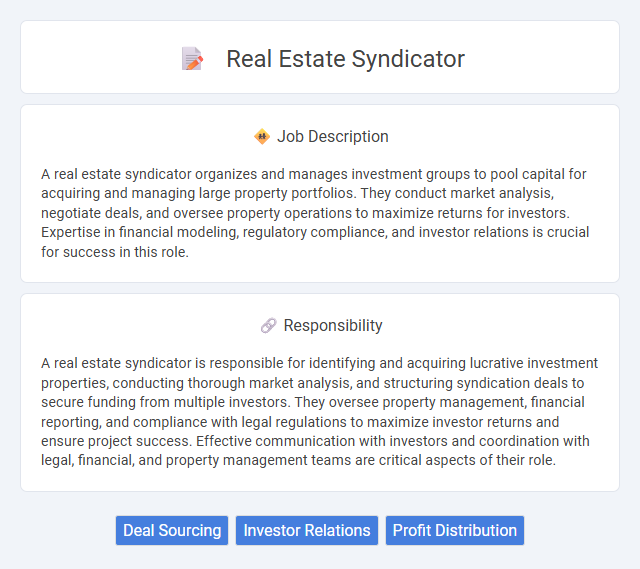
A real estate syndicator organizes and manages investment groups to pool capital for acquiring and managing large property portfolios. They conduct market analysis, negotiate deals, and oversee property operations to maximize returns for investors. Expertise in financial modeling, regulatory compliance, and investor relations is crucial for success in this role.
Individuals with strong analytical skills and a comfort with financial risk are likely to find success as real estate syndicators. Those who excel in networking, negotiation, and leadership may be well-suited for managing investor relationships and coordinating property acquisitions. People who prefer stability and low-risk environments might find the fluctuating nature of real estate syndication less compatible with their work style.
Qualification
A real estate syndicator requires strong financial acumen, expertise in market analysis, and experience in property management to successfully pool investor capital and manage complex real estate projects. Proficiency in legal compliance, contract negotiation, and investor relations is essential for ensuring regulatory adherence and maintaining trust among partners. Advanced skills in deal structuring, asset valuation, and risk assessment enhance the ability to maximize returns and effectively oversee syndication ventures.
Responsibility
A real estate syndicator is responsible for identifying and acquiring lucrative investment properties, conducting thorough market analysis, and structuring syndication deals to secure funding from multiple investors. They oversee property management, financial reporting, and compliance with legal regulations to maximize investor returns and ensure project success. Effective communication with investors and coordination with legal, financial, and property management teams are critical aspects of their role.
Benefit
A real estate syndicator may likely benefit from the potential to generate passive income by pooling investor funds to acquire large-scale properties. They often have the opportunity to build a diverse portfolio without the need for personal capital investment, which could lead to enhanced financial growth. There is also a significant chance to develop valuable industry connections and expertise while managing property deals and investor relations.
Challenge
Real estate syndicators likely encounter challenges related to securing reliable investors and navigating complex legal regulations. Managing diverse stakeholder expectations and market fluctuations probably adds to the difficulty of ensuring successful project execution. Balancing financial risks while maintaining transparent communication may also pose significant hurdles in this role.
Career Advancement
Real estate syndicators manage investment properties by pooling capital from multiple investors to acquire, operate, and sell real estate assets, leveraging strong financial analysis and stakeholder communication skills. Career advancement in this field typically involves progressing from analyst roles to senior syndicator positions, where professionals oversee larger portfolios and more complex deals. Building a robust network of investors, mastering market trends, and developing expertise in deal structuring are crucial for ascending to leadership roles or launching independent syndication firms.
Key Terms
Deal Sourcing
Real estate syndicators specializing in deal sourcing identify and secure profitable investment properties by leveraging extensive industry networks, market research, and financial analysis. They evaluate property performance metrics, negotiate purchase terms, and structure syndication deals to maximize returns for investors. Effective deal sourcing directly impacts the success of real estate investment portfolios through targeted acquisition strategies and risk assessment.
Investor Relations
A real estate syndicator specializing in investor relations manages communication between the investment team and passive investors, ensuring transparency and trust throughout the project lifecycle. They provide detailed financial reports, market analyses, and regular updates on property performance to maintain investor confidence and compliance. Effective investor relations drive successful capital raises, repeat investments, and long-term partnership growth in real estate syndications.
Profit Distribution
Real estate syndicators manage pooled investments in properties and focus heavily on structured profit distribution to maximize investor returns. They implement waterfall structures that prioritize return of capital, preferred returns, and then profit splits based on equity participation or performance hurdles. Understanding these distribution models is essential for aligning investor interests and ensuring transparent, equitable sharing of income generated from rental yields or property sales.
 kuljobs.com
kuljobs.com